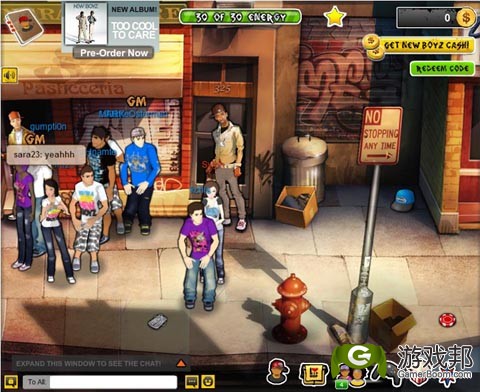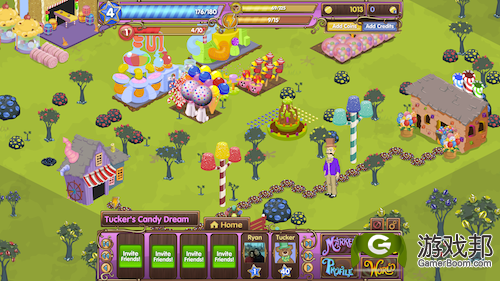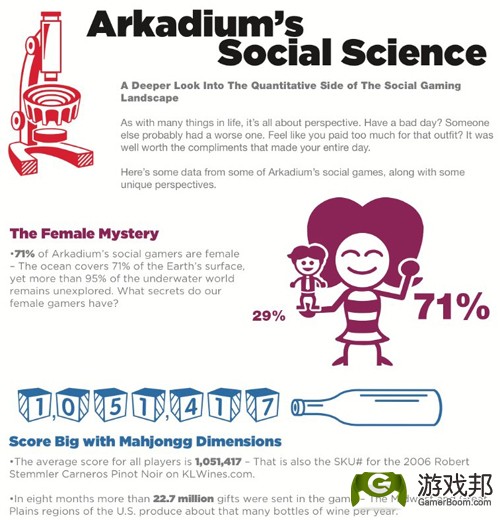每日观察:关注Zynga等社交游戏开发商市场份额(5.18)
1)RockYou亚洲公司日前在台湾发布了《快乐城市》(游戏邦注:Happy City,该游戏在日本称为Top City)这款城市建设型游戏。RockYou联合创始人沈佳表示,早在Zynga的《CityVille》发布之前,RockYou就已投入开发《快乐城市》。据他所述,台湾是一个充满竞争的市场,多数城市建设游戏属于克隆产品,但RockYou的这款游戏具有与众不同的设计和极高的可玩价值。该游戏在 日本和台湾发布时,充分 考虑了不同地区玩家的需求,添加了互有差别的本土化内容和元素。RockYou会根据该游戏在台湾市场的表现,再决定是否将其移植到手机平台或者引进美国的 Facebook平台。
2)据IHS Screen Digest最新报告显示,2010年全球社交游戏市场的总收益为14亿美元,比2009年的6.36亿美元增长了116.4%。Zynga以《CityVille》和《FarmVille》等作品的大获成功而领跑社交游戏领域,该公司在去年的广告赞助和用户消费总收益为5.44亿美元,市场份额达到39.1%,同比2009年增长了4.2%。
排在第二名的是EA旗下的Playfish,该公司去年市场份额流失了3.8个百分点,但用户在游戏中的消费增加了42%;迪士尼旗下的Playdom的市场份额则增长了0.6%,其市场份额排名第三。Crowdstar和RockYou则分别列位第四和第五。
3)跨平台发行商Viximo最近将《Ravenwood Fair》等知名社交游戏引进了Orkut和Quepasa等国际社交网络,这些游戏之前已在Facebook大获成功,所以它们可以顺利出击海外市场。不过Viximo最近发行的其交游戏《Clublift》、《Treasure Diving》、《Cupcake Corner》的发展却并不如意,《Cupcake Corner》最近在Facebook的MAU和DAU正持续走低(游戏邦注:该游戏2010年8月发布时的MAU曾突破170万,DAU则是20万)。
不过Viximo首席执行官Dale Strang表示,他们将社交游戏推向海外平台时,并不会将DAU作为首要考虑条件,而主要考虑该游戏是否具有跨族群的吸引力,是否适合翻译成其他语言。该公司业务发燕尾服副总裁Sutton Trout则补充表示,社交游戏在非Facebook平台上将获得更多发展机遇,因为这些平台的市场壁垒更少。
4)《New Boyz: The World》是一款基于Ben-J和Legacy双人乐队组合New Boyz的虚拟世界社交游戏,它是由开发商Funtactix和华纳兄弟共同于5月2日在Facebook平台发布,该游戏的主要作用是配合乐队的新专辑宣传推广。玩家在该游戏中创建个人虚拟形象,与其他粉丝通过聊天或动画表情进行互动,玩家可在游戏中体验迷你游戏、观看音乐视频,获取该乐队即将发布作品的预告信息,甚至有可能与Ben-J和Legacy通过在线动进行对话。该游戏主要通过一些付费虚拟货币盈利,玩家可将其用于购买服饰等道具来装扮自己的虚拟形象。它目前的MAU已达2万,而New Boyz的官方粉丝页面也获得了200万以上的“Likes”。
5)在2011年LOGIN大会上,传统游戏元老Richard Garriott在演讲中指出,游戏领域的发展史可划分为三个阶段:第一是单人模式游戏,主要由《超级马里奥》、《吃豆人》和Garriott自己推出的《Ultima》等游戏为代表;第二是大型多人在线游戏,例如《Ultima Online》等游戏作品;第三则是时下最为盛行的社交及休闲游戏,他认为这类游戏具有低价、获取方便、传播迅速等特点,而这个阶段的主导力量则是玩家的好友,这类游戏正是通过好友之间的口碑传播而迅速扩大影响力。
6)由Toy Studio开发的新款社交游戏《Candy Dream》在5月6日进行内部测试,该游戏以《威利旺卡与巧克力工厂》(游戏邦注:Willy Wonka and the Chocolate Factory)为主题,目前共有4643名玩家参与了该测试。这款游戏的故事背景是全世界已消耗完所有的糖果,玩家只能自己生产糖果,并将其出售到世界各个商店。玩家首先得建设一个糖果工厂,然后收割“糖果”庄稼,生产出各种各样的糖果棒。该游戏绑定的是Facebook Credits,支持玩家购买相关资源和道具,并自主发明新型糖果棒。
7)Arkadium公司最近公布了其游戏玩家的人口构成图表,从中可以发现《Mahjongg Dimensions》以及《Cooking Mama》等Arkadium游戏玩家的主力军是女性用户,其比例高达71%。《Cooking Mama》因其烹饪主题及明显的女性特征而吸引了众多女用户,所有玩家访问好友厨房的次数超过了1200万。《Mahjongg Dimensions》这款游戏则聚集了众多忠实粉丝,这些用户不但自己玩游戏,而且在好友间发送免费礼物多达2270万次。该公司的《Solitaire Heaven》和《Writer’s Blox》这两款游戏用户粘性也非常乐观,前者每次登录游戏平均逗留时间长达20分钟,后者的用户平均逗留时间为16分钟。(本文为游戏邦/gamerboom.com编译,如需转载请联系:游戏邦)
1)Zynga smokes Disney, Electronic Arts in booming social games market
Greg Lamm
Social game maker Zynga wasn’t kidding about needing more people to keep up with its booming business.
Zynga added to its lead as the leader in social games in 2010, according to a new report from IHS Screen Digest. In 2010, Zynga was able to “pad its market share lead” because of the success of its CityVille and FarmVille offerings, according IHS.
IHS says Zynga’s revenue from advertising and consumer spending was $544 million in 2010. That gave Zynga a 39.1 percent share of the global market in 2010, a 4.2 percent increase over 2009.
No. 2-ranked Playfish, owned by Electronic Arts Inc., lost 3.8 percent of its market share in 2010. Still, Playfish say consumer spending increase 42 percent in 2010.
Disney’s Playdom Inc. was No. 3. Playdom saw a 0.6 percent gain in market share in 2010.
The report said that the global market social networking games was $1.4 billion in 2010, up 116.4 percent from $636 million in 2009.
Zynga recently opened a local office and is recruiting in Seattle with companies such as PopCap Games, Big Fish Games, Microsoft, RealNetworks, and WildTangent.
Zynga is among a host of companies including Facebook and Hulu that have expand operations to the Seattle region. That has created intense competition for talent among tech companies big and small.(source:techflash)
2)RockYou Asia Rolls Out Happy City To Taiwan With High Hopes, Steep Competition
By AJ Glasser
Though focused primarily on mobile development, RockYou subsidiary RockYou Asia is experimenting with releasing a PC-based social game across multiple social networks in the region. Happy City — or Top City as its known in Japan — debuts in Taiwan this month amid heavy competition from other city-building social games.
In Happy City, players construct a town from a combination of residential housing, commercial buildings, production infrastructure, and decorations that increase the productivity of each.
Like all city building games of the day, the comparison to Zynga’s CityVille is inevitable. However, RockYou co-founder and RockYou Asia head Jia Shen tells us development on Happy City began well before CityVille was released. In the post-CityVille social game environment, the Asian market is full of city building games.
As for expansion into mobile or into the U.S. through Facebook, Shen says Happy City’s future will be determined largely by how well it does in Taiwan. You can check the game out for yourself via Facebook and on AppData, our traffic tracking service for social games on the Facebook platform.(source:insidesocialgames)
3)Viximo Sees Hope For Smaller And Declining Facebook Developers Through Cross-Platform Publishing
By AJ Glasser
Cross-platform publisher Viximo has been racking up more social game partners for its distribution platform, this time pulling a couple of off-Facebook games into the mix. Viximo CEO Dale Strang explains how the company hopes to deliver benefits to smaller games with global aspirations.
Back in January, Viximo signed some bigger-name social games like Ravenwood Fair that very obviously drew benefits from cross-platform publishing on international social networks like Orkut and Quepasa because the games already had success finding users on Facebook. Today, the company’s newest social game partners — Clublife, Treasure Diving, and Cupcake Corner — are either not on Facebook at all, or haven’t been able to hang onto users. Cupcake Corner in particular seems to be suffering a steady loss across monthly and daily active users on Facebook after breaking 1.7 million MAU and 200,000 DAU four months after its August 2010 launch.
None of that matters if the game is a good fit for international social networks, Strang says.
“What we look at is, ‘Do we think that it’s a game that’s attractive to a bunch of different demographics, will it translate to different languages?’” Strang tells us. “We don’t just go with whatever the DAU trends are. If a game developer feels like they’re reaching the point of diminishing returns on Facebook, that might be a good time to go with us.”
Viximo assumes responsibility for user acquisition across its web of social networks in North America, Europe, and Latin America and then takes a share of the game’s revenue after its launched. It also handles localization and currency management between networks, making recommendations to developers on how to control pricing using various network currencies like Facebook Credits.
Viximo VP of Business Development Sutton Trout adds that if a game isn’t on Facebook, that “often may be a better time” because there are fewer barriers to integration across multiple networks.(source:insidesocialgames)
4)New Boyz: The World Experiments With Fan-To-Celebrity Engagement
By Carolyn Koh
New Boyz: The World is a virtual world social game hybrid built around New Boyz rap duo of Ben-J and Legacy. Launched on May 2 just ahead of the group’s new album release, The World is a promotional vehicle developed by Funtactix in conjunction with Warner Brothers for Facebook.
New Boyz: The World asks players to create human avatars inside a modern-themed setting where they can interact with other fans via chat or with animated emotes, like dancing. Beyond that, players get simple delivery and collection quests from the rap duo (as non-player characters), play mini-games, watch music videos and get a chance to preview soon-to-be-released music.
Players will also get a chance to chat with Ben-J and Legacy during live events.
New Boyz: The World monetizes with the sale of premium currency, New Boyz cash, which is used to buy clothing for your avatar and a premium dance move. Whatever you can’t buy with New Boyz cash in-game is free. As players explore the world or play mini-games, they are also treated to New Boyz music as a sort of soft currency. Additionally, mini-games are themed to New Boyz music; such as Piggy Bank Smash, where players click on targets to smash a piggy bank while New Boyz single “Break My Bank” plays in the background.
The interesting concept New Boys: The World introduces to Facebook is the exclusive digital release of albums in-game. Funtactix and Warner Bros. announced the exclusive release of Too Cool To Care in New Boyz: The World less than a week after the game went live, so it’s difficult to determine how much of the first week growth in monthly active users can be attributed to the album itself. Furthermore, we’re not sure how many users the game will direct to physical purchases of the album outside of the game. New Boyz: The World currently has 20,000 MAU while the New Boyz official fan page has over 2 million Likes. For the time being, the in-game album feature is the only way fans can act as consumers of the album. Players who preview the album in-game receive New Boyz cash to customize their characters.(source:insidesocialgames)
5)Garriott Keynote Addresses the Three Eras of Gaming
By Alexander Bevier
Richard Garriott believes that the third era of video games has begun. Casual, social games are paving their way through the last two, and are a driving force in the medium for the next several years. in his LOGIN 2011 Keynote, Garriott discussed what these eras are.
The first era was single-player games. These games were solo merely by the inability for other players to comfortably join. This era pioneered by games like Super Mario Land, Pac-Man, and Garriott’s own Ultima franchise.
Despite the success of this era, it took roughly 20 years to develop and mature, but the games were predominantly played by nerdy men.
Later, online games started to take the market. Massively Multiplayer games are gaming’s second era. Ultima Online–originally called Multima– paved the way for these games, but Garriott notes that it was a project no one initially believed it. “This is the hardest game I’ve ever had tried to get going,” he noted as he described the trouble. He later had to go over-budget on Ultima IX, and used that extra money to start creating the game. This gamble eventually paid off because Ultima Online sold more copies than Ultima 1-9 combined, according to him.
Garriott notes that his is an era because it was pioneered by multiplayer games. In the keynote, he shows examples of how Ultima Online (made in 1999) looked most like Ultima 6 (from 1990).
However, press allegedly still praised about the game because of the online component. In the next decade, online games and virtual worlds would become a major force in the industry.
The third–and current–era is the time for social, casual games.“The games in this new grand era are cheap/free to acquire. And they spread virally” Garriott states that he’s already impressed and amazed by the amount of people already working in this design space, and by the speed this era is growing.
Garriott claims that this era is pioneered by the player’s friends. “The people you’re playing with aren’t the strangers you played with in an MMO, They’re the friends you already know.” He also stated that this is the first time games are being played by every demographic. “Instead of being a teenage wealthy nerd, we’re now really getting everybody.”
Richard Garriott claims that he’s had three jobs in his life, and these three jobs cater to each era: Origin Systems–where he created single-player RPGs; Destination Games–where he worked on Tabula Rasa; and Portalatium–where he’s currently working on two social games.
Additionally, he says that these eras are progressing quicker every day. While single player games took twenty years to grow, and MMOs took roughly a decade, it’ll be much sooner for social games to develop. “ [Social games will] dominate era of the next five years”(source:loginnews)
6)Candy Dream Combines Magical Nostalgia With Realistic Supply and Demand Economy
By Pete Davison
Candy Dream is a new game from developer Toy Studio, in closed beta since May 6. Keeping with a Willy Wonka & the Chocolate Factory theme, players can only enter the game with “Golden Ticket” invites issued from the official website. So far, 4,643 users have accessed the beta.
Candy Dream’s premise is that the world has run out of candy and it is up to the player to produce candy and sell it to the stores in the various towns around the game world. This is achieved by building up a candy factory, harvesting “candy” crops and developing recipes to produce different types of candy bars. Later in the game, players get the opportunity to specialize in specific types of candy, and can pick an additional specialization every 10 levels.
The game is monetized exclusively through the use of Facebook Credits, which can be used to purchase energy-restoring items and soft currency as well as premium goods from the in-game marketplace. They can also be used to instantly create new candy bars rather than having to wait for the machines to make them. Many of the game’s items and buildings can be purchased using the game’s soft currency, but as is usually the case with games of this type, using Facebook Credits can help make progress a little quicker.(source:insidesocialgames)
7)Arkadium’s Social Science infographic shows off the company’s stats on Facebook
by Brandy Shaul
While most Facebook or even simply casual gamers understand many of the major trends in the landscape – that most social gamers are female, that gamers are willing to spend real money on virtual items, etc. – Arkadium has taken a deeper look at their own suite of games, offering us a fun, yet still informative infographic detailing all things from Mahjongg Dimensions to their Facebook adaptation of the casual game Cooking Mama.
So what did we learn? We’ve seen a confirmation that the majority of Arkadium’s players are female – at a figure of 71%, to be exact. I hate to break out a stereotype, but Cooking Mama’s audience might account for the biggest female swing, as (even outside of the cooking gameplay), the game is simply filled with every stereotypically female color or pattern known to man – pink and purple of all shades, along with glitter and sparkles. It’s something the girly-girls have to love.
But what if you’re more into matching patterns on cubes? With Mahjongg Dimensions still pulling in over one million players every month, it looks like those that have stuck around are pretty loyal, as they’ve built up a high average score: 1,051,417 points per game. And these players aren’t just playing by themselves, as over 22.7 million free gifts have been sent between players. Could it be the fact that you’ll unlock new bonuses in each game that drives the high rate of gifts sent? That is, rather than a “useless” item, most of Mahjongg Dimension’s gifts have a definite purpose. That’s something to think about for new developers trying their hand at social games – that usefulness and function could very well drive virality over pretty colors.
But that’s not all; in fact, the infographic is just getting started.
We’ve learned that Arkadium knows how to keep players interested over long periods of time, as both Solitaire Heaven and Writer’s Blox keep players entertained for lengthy gameplay sessions. The average player spends 20 minutes in Solitaire Heaven each time they log in, while Writer’s Blox users can spend an average of 16 minutes on a single puzzle in the game.
Finally, heading back to Cooking Mama, we’ve learned that a whopping 5,035,709 meals have been served, but we weren’t given an exact time frame for how long it took to reach this number – just that it was within the “past few months.” Either way, this is an impressive figure, made even more so when combined with the fact that players have visited their friends’ kitchens over 12 million times.
What does all of this mean in the long run? Ultimately, Arkadium’s player-base has proven to be a dedicated one, and the company is feeling mighty proud of what they’ve accomplished – and with good reason. Mahjongg Dimensions, the company’s biggest game, may have a relatively small set of users, but the numbers are stable. Even big names like Zynga can’t say that, as their games seem to be losing players at an alarming pace. With these numbers backing up Arkadium’s success, it will be interesting to see where the go from here.(source:games)















































 闽公网安备35020302001549号
闽公网安备35020302001549号